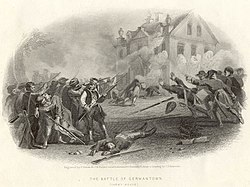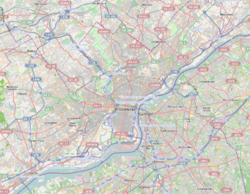Colonial Germantown Historic District
|
Colonial Germantown Historic District
|
|
 |
|
| Location | Both sides of Germantown Avenue, between Windrim Avenue and Sharpnack Street Philadelphia, Pennsylvania |
|---|---|
| Area | 113 acres (46 ha) |
| Built | 1683 |
| Architect | Multiple |
| Architectural style | Colonial, Georgian, Federal |
| NRHP Reference # | 66000678 |
| Significant dates | |
| Added to NRHP | October 15, 1966 |
| Designated NHLD | June 23, 1965 |
The Colonial Germantown Historic District is a designated National Historic Landmark District in the Germantown and Mount Airy neighborhoods of Philadelphia, Pennsylvania along both sides of Germantown Avenue. This road followed an Indian path from the Delaware River just north of Old City Philadelphia, through Germantown, about 6 miles northwest of Center City Philadelphia, and on to Pottstown. Settlement in the Germantown area began, at the invitation of William Penn, in 1683 by Nederlanders and Germans under the leadership of Francis Daniel Pastorius fleeing religious persecution.
Colonial Germantown was a leader in religious thought, printing, and education. Important dates in Germantown's early history include:
The district was designated a National Historic Landmark in 1965 and was added to the National Register of Historic Places in 1966. The original district included the 4500 to 6600 blocks of Germantown Avenue (between Windrim Avenue and Sharpnack Street). In 1987 the district was expanded north to the 7600 block of Germantown Avenue (up to Cresheim Valley Drive), which is the southern boundary of the Chestnut Hill Historic District. The district's two parts contain 579 properties, of which 514 are considered contributing, and only 65 non-contributing. The northwest Philadelphia area, which promotes itself as "Freedom's Backyard," contains 11 historic districts listed by the National Register of Historic Places, as well as 58 separately listed properties. Eight state historical markers are located on Germantown Avenue. Nearly complete inventories prepared for the National Register of Historic Places, both for the original district and for the expanded area are available. A 1907 inventory of historic buildings in the area was printed in the "History of Old Germantown."
...
Wikipedia



